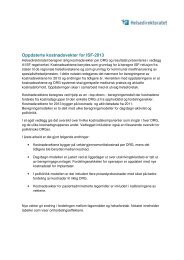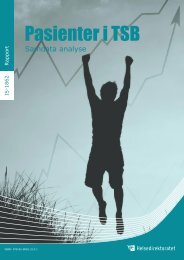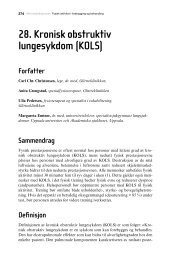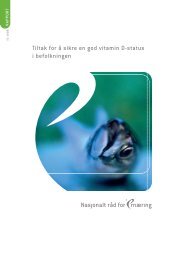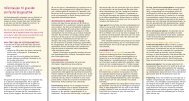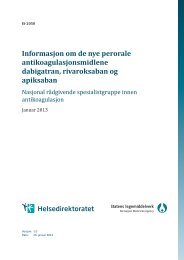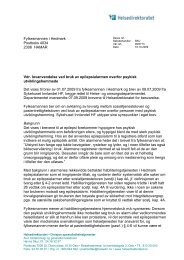Last ned - Helsedirektoratet
Last ned - Helsedirektoratet
Last ned - Helsedirektoratet
Create successful ePaper yourself
Turn your PDF publications into a flip-book with our unique Google optimized e-Paper software.
Summary<br />
In recent years, a number of articles have been published on the effects of alcohol on the<br />
foetus, and health authorities in a number of countries have published reports on pregnancy<br />
and alcohol. The focus has shifted from the consequences of high intake of alcohol during<br />
pregnancy to the effects of moderate to low consumption of alcohol on the foetus. Based on<br />
research from recent years, it is now clear that there is no safe lower limit for alcohol<br />
intake during pregnancy. Alcohol can damage the foetus in all phases of pregnancy,<br />
the damage is irreversible, can cause a wide range of effects and is totally<br />
preventable. A number of countries have now taken this knowledge into account and<br />
recommend total abstinence throughout pregnancy.<br />
Because of the new knowledge on pregnancy and alcohol, the Directorate for Health and<br />
Social Affairs has appointed a fast-working committee with a mandate to consider the<br />
prevention of damage caused by alcohol intake during pregnancy, as well as examination<br />
and treatment of such damage. The group has gone through relevant literature with regard to<br />
strict requirements for scientific strength of evidence as well as reports on alcohol and<br />
pregnancy from other countries.<br />
FAS/FAE<br />
Foetal alcohol syndrome (FAS) is characterised by specific facial features (smooth philtrum,<br />
narrow upper lip and short palpebral fissures), growth retardation and central nervous system<br />
abnormalities. These abnormalities may include growth restriction of the brain and/or<br />
problems with intellectual development, behaviour disturbances, and learning disabilities.<br />
The children may also have other congenital malformations, e.g. congenital heart defects.<br />
FAS is particularly associated with high alcohol consumption during the first trimester of<br />
pregnancy. Children with foetal alcohol effects (FAE) have the same central nervous system<br />
abnormalities however they have normal facial features. Both groups may have been<br />
exposed to alcohol throughout pregnancy, but due to normal facial features, FAE is more<br />
difficult to diagnose.<br />
There was a great deal of attention to FAS in Norway after the syndrome became known<br />
here in the 1980s, and there were campaigns on the importance of reducing alcohol<br />
consumption during pregnancy. Since then there has been relatively little focus on the issue<br />
from central authorities. At the same time the media have focused on reports that alcohol<br />
may have a positive effect on a number of diseases in adults. This has contributed to<br />
creating an impression that alcohol is harmless or even healthy.<br />
Alcohol intake, young women and pregnancy<br />
A number of national and international studies have discovered a steep increase in young<br />
people’s alcohol consumption over the last decade. The greatest increase is found among<br />
young people of fertile age. They drink more frequently than before and also have higher<br />
alcohol intake when they drink. Recent studies from Scandinavian countries show that many<br />
women have hazardous alcohol intake during pregnancy, even before they know they are<br />
pregnant. As an example, a study from Denmark found that 40% of pregnant women had<br />
had episodes of binge drinking (5 glasses or more on one drinking occasion). A Swedish<br />
study found that 87% of pregnant women were drinking alcohol during the first trimester,<br />
17% of them had a hazardous consumption. Binge drinking is considered particularly harmful<br />
to the foetus.<br />
11





